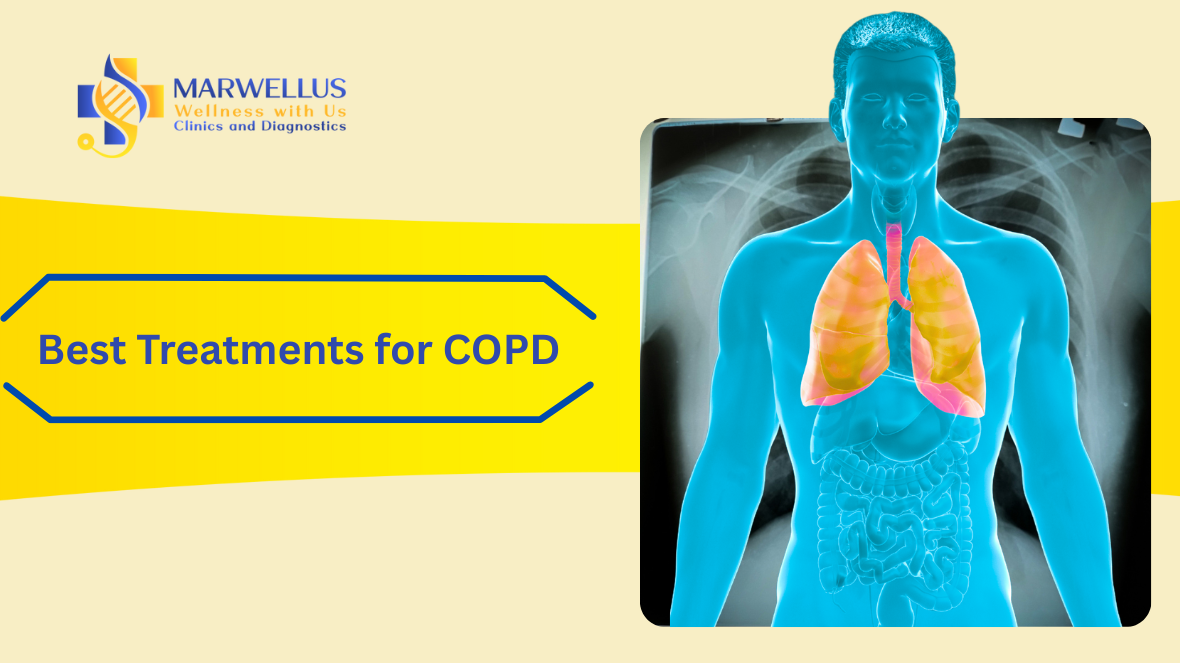Chronic Obstructive Pulmonary Disease (COPD) is a long-term condition that impacts the lungs and makes it difficult to breathe. Millions of people worldwide live with COPD, and while there is currently no cure, effective treatments are available. These treatments focus on reducing symptoms, improving daily life, and slowing the progression of the disease.
Understanding the best treatment options is fundamental for managing the condition and maintaining independence. In this blog, we will explore the most effective COPD therapies, lifestyle changes, and new advancements in treatment.
Understanding COPD
COPD is an umbrella term for lung conditions, including emphysema and chronic bronchitis, that damage the airways and reduce airflow. It is characterised by persistent symptoms such as:
- Chronic cough that produces mucus
- Shortness of breath even with mild activity
- Wheezing and tightness in the chest
Causes and Risk Factors:
- Smoking is the leading cause of COPD, though long-term exposure to air pollutants, occupational dust, or chemicals can also play a role.
- Genetic factors, such as alpha-1 antitrypsin deficiency, increase susceptibility in some individuals.
Left untreated, COPD progressively worsens, but early diagnosis and treatment can make a substantial difference in quality of life.
Types of COPD Treatments
Medications
Medications play a critical role in COPD management, helping to open the airways, reduce inflammation, and control symptoms.
- Bronchodilators: These relax the muscles around the airways.
- Short-acting bronchodilators are used for quick relief.
- Long-acting bronchodilators provide ongoing symptom control.
- Steroids (Corticosteroids): Used in inhalers or tablets, these help reduce airway inflammation and prevent flare-ups.
- Phosphodiesterase-4 inhibitors: A newer class of drugs that reduce inflammation in severe cases of COPD.
- Combination therapies: Many patients benefit from inhalers that combine bronchodilators and corticosteroids for more effective control.
Oxygen Therapy
Low blood oxygen is a common complication of COPD. Oxygen therapy provides supplemental oxygen to help maintain healthy levels.
- Improves energy and sleep quality
- Reduces strain on the heart
- Essential for patients with advanced COPD or frequent drops in oxygen levels
Pulmonary Rehabilitation
This is a structured programme designed for people with chronic lung diseases.
- Includes exercise training, breathing techniques, and nutritional advice
- Provides education to help patients manage symptoms and medications effectively
- Offers emotional and psychological support, helping patients cope with anxiety and depression related to COPD
Surgical Options
For patients who do not respond well to medication or rehabilitation:
- Lung Volume Reduction Surgery (LVRS) removes damaged lung tissue to improve breathing efficiency.
- Lung transplantation is considered for end-stage COPD when other treatments are no longer effective.
Lifestyle Changes to Support COPD Treatment
Treatment success depends heavily on lifestyle adjustments:
- Smoking cessation: The most critical step in slowing COPD progression. Quitting smoking can prevent further lung damage.
- Healthy diet: A balanced diet with lean proteins, fruits, and vegetables supports immune function and helps manage body weight.
- Exercise and physical activity: Gentle activities, such as walking, cycling, or yoga, help strengthen muscles and improve breathing.
- Stress and mental health management: Anxiety and depression are common in COPD patients. Relaxation techniques, counselling, or support groups can help maintain mental well-being.
Emerging Treatments and Future Directions
Research on COPD is rapidly advancing, offering hope for more effective therapies.
- Biologic therapies are being tested to target specific inflammatory pathways.
- Precision medicine aims to create personalised treatment plans based on individual genetic and clinical profiles.
- New inhaler technologies and innovative drug combinations are improving convenience and outcomes for patients.
These breakthroughs hold promise for better management and longer, healthier lives for those with COPD.
In Conclusion
COPD treatment is not one-size-fits-all. It requires a combination of medications, oxygen therapy, rehabilitation, lifestyle changes, and sometimes surgery. With proper care, patients can control symptoms, reduce flare-ups, and live more fulfilling lives. If you or a loved one is experiencing COPD symptoms, consult a pulmonology expert who can help you with a personalised treatment plan and take charge of your long-term lung health.
Breathe Easier with the Right COPD Care
Living with COPD doesn’t mean giving up on your quality of life. Speak with our pulmonologist at Marwellus Clinics & Diagnostics Centre today and explore tailored COPD treatment options, from advanced inhalers to pulmonary rehabilitation programmes. Early intervention and consistent care can slow progression and improve daily living. Schedule your consultation now!
FAQs
Q1: What is the most common treatment for COPD?
Bronchodilators, often combined with corticosteroid inhalers, are the most common and effective treatments for managing symptoms.
Q2: Can COPD be cured?
Currently, there is no cure for COPD. However, treatments can significantly slow its progression and improve quality of life.
Q3: How do I know if I need oxygen therapy?
Your doctor will check your blood oxygen levels using a pulse oximeter or a blood test. Oxygen therapy is recommended if levels are consistently low.
Q4: Is pulmonary rehabilitation effective for all COPD patients?
Yes, most patients benefit from pulmonary rehabilitation. It improves exercise capacity, reduces symptoms, and enhances overall quality of life.
Q5: Can lifestyle changes really make a difference in COPD?
Absolutely. Quitting smoking, eating a balanced diet, staying physically active, and managing stress are essential for supporting medical treatments and enhancing long-term health outcomes.



